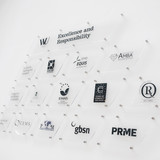A Place among the World’s Leading Universities
WU has been granted its first five-year accreditation from AACSB International (The Association to Advance Collegiate Schools of Business).
Together with the EQUIS and AMBA accreditations, WU now holds the full triple accreditation for business universities, a rare and sought-after distinction. Places among the top 15 institutions listed in the Financial Times and Handelsblatt rankings have further cemented WU’s reputation as a leading international university.
There are three major accreditations for internationally renowned business and economics universities and business schools: EQUIS (European Quality Improvement System), AACSB (The Association to Advance Collegiate Schools of Business), and AMBA (Association of MBAs), a program-specific accreditation. After its initial EQUIS accreditation in 2007, WU was awarded the maximum five-year EQUIS re-accreditation in 2013. As the first and only MBA provider in Austria, the WU Executive Academy received the global AMBA accreditation in 2010. This accreditation was renewed for a term of five years in 2014. In 2015, WU also received an AACSB accreditation, completing its triple accreditation. This means that now all of WU’s 27 academic programs have been certified to meet strict international standards.
Member of an Elite Circle
WU now belongs to an elite circle of some of the world’s leading business schools: Only 73 business schools and universities around the world – fewer than 1% – can claim triple accreditation by EQUIS, AACSB, and AMBA. What does this success mean for WU? “The awarding of the AACSB accreditation confirms the success of WU’s long-term internationalization strategy and it shows that we are well on our way to fully living up to our role as one of Europe’s leading universities of economics and business,” says Oliver Vettori, WU’s Dean for Accreditation and Quality Management. The triple accreditation confirms that WU fulfills the highest international academic quality standards, but it also requires WU to constantly evaluate and further improve the quality of its activities. The AACSB, EQUIS, and AMBA accreditations are extraordinary achievements for WU, especially with regard to the difficult political situation in the context of higher education in Austria.
EQUIS and AMBA play an important role especially in Europe and Asia, while AACSB is highly respected in the Anglo-American region. The triple accreditation not only strengthens WU’s reputation in the academic community, but it also gives WU a significant edge over other universities with regard to faculty recruitment and offers a number of specific advantages for WU students and graduates.
Tangible Benefits

Students benefit from the fact that internationally, a degree from WU is now more highly regarded than ever, which improves the international employability of WU graduates. Driven by the high quality of WU’s research activities, the university is constantly updating and developing its degree programs and their academic content with an international perspective. With a more highly renowned qualification, WU graduates are significantly more competitive in the global job market. The business community, in turn, benefits from graduates who are known to meet high academic and ethical standards and are very well prepared for jobs at business enterprises or in research.
Place 13 Worldwide, Place 4 in Europe
Recent ranking results further underline WU’s steady development into a leading university of world renown. With the Master’s Degree Program in International Management, its English-taught flagship program, WU moved up nine spots in the Financial Times Global Masters in Management 2015 ranking, coming in on place 13. This is the first time that WU places among the top 15 out of the 80 European business schools ranked. The annual Financial Times ranking of the world’s best academic programs in management is based on 16 differently weighted criteria in three categories: alumni career progress, diversity (percentages of female and international students and personnel), and international exposure and research. Excellent results in the individual rankings testify to the great international success of the Master’s Degree Program in International Management: 95% of graduates found employment within three months of graduation. They praised the high extent to which they had achieved their aims.
Another aspect that was rated very positively are the numerous opportunities the WU Master’s Program in International Management offers its students to study abroad at renowned partner universities, to complete international internships, and to get in touch with leading companies. With the Master’s Program in International Management, WU offers one of the top-rated programs in Europe and has achieved a place among the four top-ranked universities in the German-speaking area.
Strong Research at WU

Moving up two notches, WU also came in on place 13 in the latest Handelsblatt ranking of the 25 most successful research universities in the field of economics in Germany, Austria, and the German-speaking areas of Switzerland. Since 2006, the German business daily Handelsblatt has been evaluating and ranking the research performance of economics departments on a regular basis. The Handelsblatt ranking is based on journal articles published by researchers in the field of economics. These articles are fed into a database that comprises publications authored by 3600 economists, published in 1500 academic journals,. It is also worth pointing out that the Handelsblatt lists four WU economists under the top 250 researchers honored for their lifetime achievement: Harald Badinger (Head of the Institute for International Economics, place 202), Wolfgang Lutz (Head of the Demography Group, among other functions, place 219), Clive Spash (Institute for Multi-Level Governance and Development, place 227), and Jesus Crespo Cuaresma (Head of the Institute for Macroeconomics, place 228). Professor Crespo Cuaresma also placed 7th in the Handelsblatt ranking of the top 100 researchers under the age of 40.
Accreditations
EQUIS (European Quality Improvement System) is an accreditation system for business schools that was established in 1997 by the Brussels-based European Foundation for Management Development (EFMD).
AMBA, the Association of MBAs, is the UK’s most prestigious accreditation service. Since 1989, AMBA has also been awarding accreditations to programs offered by business schools outside the UK.
AACSB International is a nonprofit membership organization for the advancement of management education. It was established in the US in 1916, with Harvard University as one of its founding members.

![[Translate to English:] LC auf dem Campus WU](/fileadmin/wu/_processed_/c/f/csm_BOAnet_FF_20140825_1301_-_Kopie_4459addeb9.jpg)


